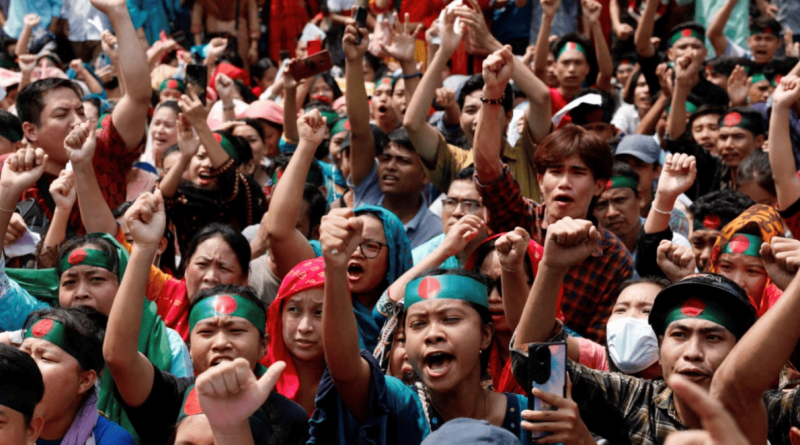Mobs, Murders, and Silence: Bangladesh Yunus Govt’s Human Rights Catastrophe
The interim government led by Nobel laureate Muhammad Yunus has thus become a dark chapter of impunity, mob violence, and moral decay.
The people of the country had high hopes from the interim government led by Nobel Peace Prize laureate Muhammad Yunus. With his international reputation, commitment to human rights, and determination to avoid political bias, the nation expected stable, transparent governance. But within just 10 months, those hopes have been shattered, replaced by a terrifying reality marked by mob violence, impunity, and state indifference.
On July 3, in Koraibari village of Bangra Bazar police station in Muradnagar upazila, Comilla, a brutal mob violence incident occurred under the pretext of drug dealing. A mother and her two sons and daughters were mercilessly killed, and another daughter seriously injured. Yet, no case has been filed, and no arrests made. The victim family’s hope for justice now seems impossible, leaving them with little option but to abandon demands for punishment.
Since August last year, under the interim government led by Muhammad Yunus, mob violence has become a frequent and horrifying reality.
Want to seize someone’s house? Label them an Awami League opponent or assign some other false tag, then unleash mob violence against them. Want to take over a business? Spread violence by branding the owner a political opponent. Want to evict someone from a government or private institution? Use the same dirty tactics and start mob violence. Want to confiscate property? Do the same. Didn’t receive extortion money? Target them. Have a longstanding feud? Politicize it and trigger mob violence.
This is how mob violence runs rampant in the country today. And the government remains indifferent—often, these acts occur with the tacit approval or direct involvement of government-backed groups.
According to reports in various Bangladeshi newspapers, under the interim government led by Muhammad Yunus, from September last year to June this year—a period of just 10 months—174 people have been killed and 281 seriously injured in mob violence incidents. In the six months from January to June 2025 alone, 62 people were killed and 206 seriously injured. In June, 41 mob violence incidents resulted in 10 deaths and 47 serious injuries. These statistics are a shameful indictment of the state of law and order.
It is deeply regrettable that the government has failed to take effective action against these crimes. Instead, the government press wing denies these incidents and presents the term “mob” as merely a political narrative of the Awami League, which is utterly condemnable and suggests government complicity.
Government officials must not forget that “mob” is not a political label but a description of unlawful, violent behavior. Wherever violence, disorder, or lawlessness occurs, it is rightly identified as “mob behavior,” regardless of politics. Governments and analysts worldwide use this term in similar contexts.
This government is not only failing but, in many cases, silently enabling violence. The inaction of law enforcement, lack of investigations, failure to arrest criminals, and denial of events as “political propaganda” reveal a deliberate avoidance of responsibility.
The ruling party also propagates a narrative that the Awami League, during its rule, committed numerous extrajudicial killings and fostered impunity — trying to justify those acts and deepen a culture of lawlessness.
The current government attempts to downplay mob violence by labeling it an Awami narrative. However, mob violence is a real, social-political violent phenomenon, not a political label. This government misleads the public by politicizing it to cover its failures.
Even critics of mob violence are branded “Awami League supporters” by the government. They forget that dissent cannot be politically tagged. Criticizing a protest does not make someone a “soft Awami.” This is a clear attempt to suppress political expression.
While people suffer attacks, looting, and killings, the government ignores their plight, dismissing them as “not mobs, but reactions.” This indifference and moral decay during a Nobel laureate’s tenure will be remembered as a disgrace.
The culture of calling lies truth, criminals innocent, and protesters “Awami Collaborator” is dangerously growing.
The government suppresses protests by politically tagging protesters. Criticism of violence is met with accusations of being “enemies of Awami League,” and even neutral voices are labeled “soft Awami.” This is an attack on democratic rights. If it continues, freedom of speech will disappear.
The interim government led by Nobel laureate Muhammad Yunus has thus become a dark chapter of impunity, mob violence, and moral decay. Its governance symbolizes a broken state, not justice or rule of law.
Unless accountability is ensured immediately, the country’s future will plunge into darkness. The sole responsibility lies with the Yunus government — and history will judge it harshly.


